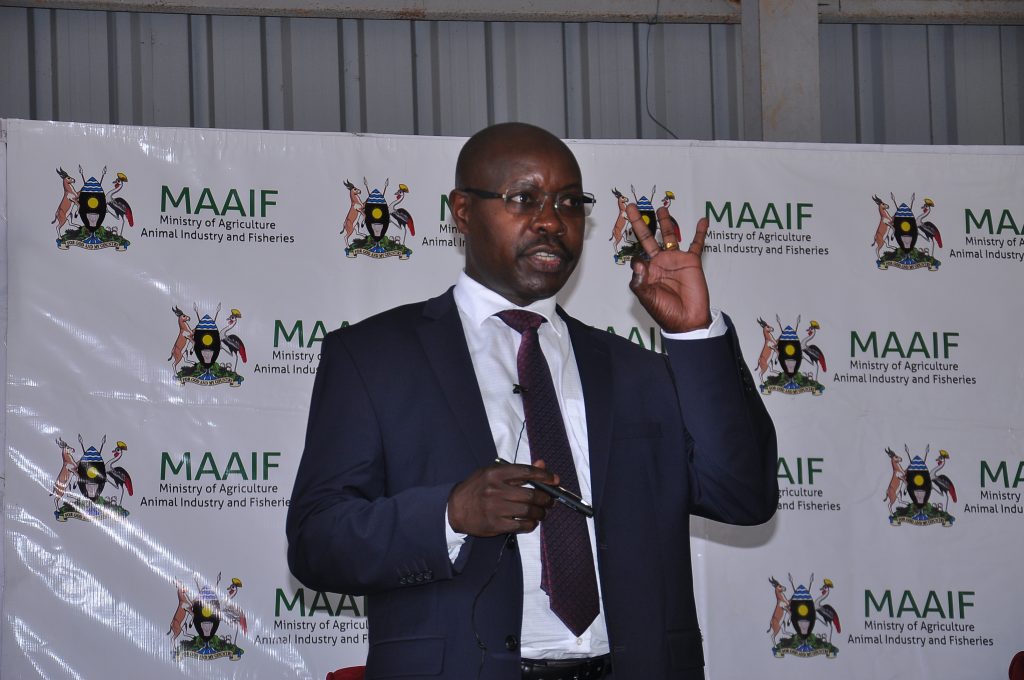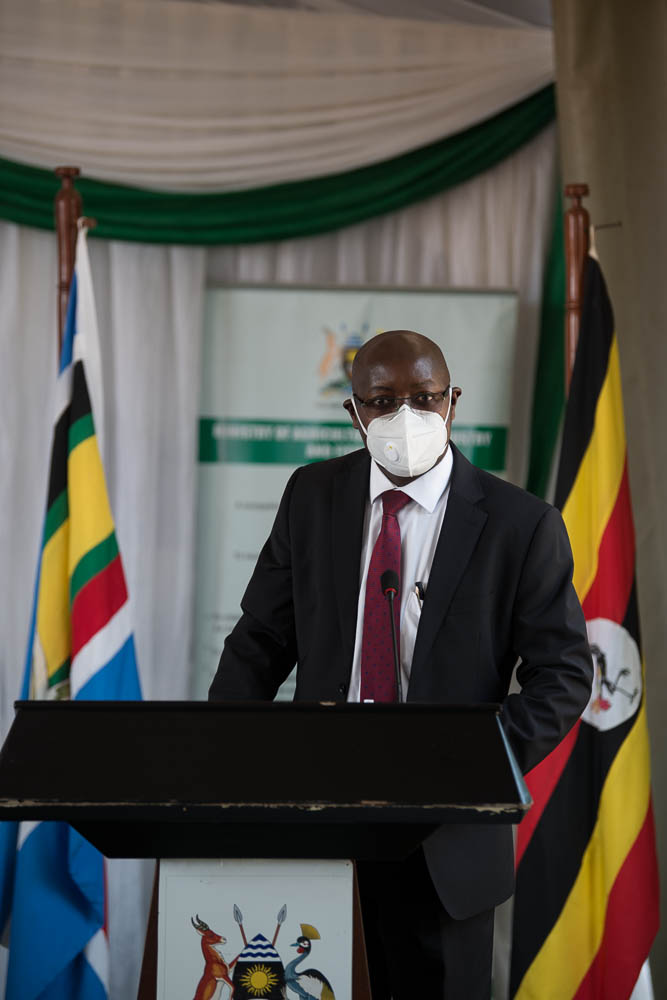
UN food systems summit: MAAIF to lead on safe and nutritious food
In the build-up to the United Nations (UN) food Systems Summit which will be convened by the Secretary-General of the United Nations in September 2021, the Ministry of Agriculture, Animal Industry and Fisheries (MAAIF) has been charged with focusing on track one dubbed, “on ensuring access to safe and nutritious food for all.” Under the supervision of the Office of the Prime Minister (OPM), MAAIF is going to generate information on “Ensuring Access to Safe and Nutritious Food” which information will be used by Uganda at the aforementioned summit. “An inclusive multi-stakeholder approach is being used for Action Track 1 given its overarching nature. Lateral consultations within (intra) and between (inter) sectors and local governments will generate a preliminary consensus that will form the basis for discussions and set of priority issues for the national position towards the Summit,” Mr. Alex Bambona MAAIF’s Assistant Commissioner, food & nutrition security, said. Mr. Bambona explained that MAAIF has been charged with tracking it because “access to safe and nutritious food for all” is heavily reliant on the agriculture sector and this track, inter-alia, seeks to address malnutrition in all its forms by ensuring access to healthy diets. The Ministry has prioritized four objectives to be achieved under track one which includes; Identify strategic priorities, policy and program actions to accelerate the reduction of hunger, food insecurity, and all form of malnutrition in Uganda; promote nutrition-sensitive value chains that deliver diverse nutritious foods that are competitive on the market and have high returns on food and nutrition security; enhance quality assurance and safety across the food value chain to equitably deliver safe and quality assured food and strengthen policy, legal and institutional mechanisms to reduce inequality in access to safe and nutritious food.
Citing its overreaching nature, Mr. Bambona said that an inclusive multi-stakeholder approach is to be used to get information for Track 1. “Lateral consultations within (intra) and between (inter) sectors and local governments will generate a preliminary consensus that will form the basis for discussions and set of priority issues for the national position towards the summit,” he said.
Information for Track 1 according to the ministry will be contributed by key stakeholders involved in and influencing policy and programs in agriculture, food security, and nutrition. “Sectoral members under the MAAIF national and subnational structures; representatives from other MLGAs; Development Partners supporting Food and Nutrition Security; Civil Society Organisations; Academic and Research Institutions; Private sector representatives supporting food and nutrition security (farmers, aggregators, traders, processors/manufacturers, and other value chain actors,” Mr. Bambona said.

Recently when he was opening regional dialogues for track one, Mr. Peter Wakabi Kasajja, the MAAIF Permanent Secretary explained how COVID-19 had exposed weaknesses and vulnerabilities of Uganda’s Agri-Food System. “It disrupted an already fragile food supply chains that increased post-harvest losses (fresh food), increased malnutrition and food insecurity, reduced food consumption and resulted in poor dieting especially for rural and urban poor,” Mr. Wakabi said adding that at the same time, COVID-19 had provided an opportunity for Uganda to rethink its Agri-Food System, focusing on improving and strengthening sustainable Food Production and Food Supply Chains, Promoting and strengthening Food Safety and Post-Harvest Handling Infrastructures, Promoting Healthy Diets and enforcing Consumers Protection Rights, among others.
“When we combine with the escalating prevalence of Non-Communicable Diseases (NCDs) which all seem to need the same nutrition intervention as Covid 19; i.e. more consumption of fruits, vegetables or immune-boosting foods and a healthy lifestyle in general, then never has been an opportunity to reflect deeply on good nutrition been obvious than today in all our countries. The upcoming dialogues on food systems are thus very timely and will help us to rethink and take bold steps to transform the country’s food system to ensure food and nutrition security for all,” Mr. Wakabi said adding that to build a resilient, inclusive and sustainable Agri-Food System that will ensure access to safe nutritious foods for all, the country needs to address some gaps in Food and Nutrition Policy and Legislation including but not limited to Food Safety Policy and Legislation (addressing Food Safety issues along the farm-to-fold spectrum); Food and Nutrition Act catering for the Strategic Food Reserve, Food Aid, and Distribution, Foods Banks; Reviewing Food Standards and Labeling (to promote and facilitate the trade of healthy and safe food); Consumers Protection Act (to ensure the right to food and consumption of healthy diets). Dr. Antonio Querido, the Country Director of the Food and Agriculture Organization (FOA), weighed into the debate, explaining that Uganda is on the course of adopting a robust policy agenda that will support food systems and improve nutrition. “The National Development Plan III 2020/21 – 2024/25 provides robust programs on agro-industrialization, human capital development, natural resources management, natural resources management, and community mobilization which if well harnessed can deliver on the transformation of food systems.”
The upcoming UN food systems summit, Dr. Querido said will offer an incredible opportunity for an inclusive engagement of all actors to adopt recommendations for the global community and nations to invest in diverse ways to make food systems inclusive. “Whereas the entire 5 tracks of the summit are so encompassing on FAO work and direction, Track 1 of the summit on ‘Equitable Access to Safe and Nutritious Food’ is the most critical in driving other Tracks,” Dr. Querido said.” The track is broad and encompasses issues of food security, food safety, value addition, the nutritional quality of foods, and reducing malnutrition in all forms. By dealing with how food is availed, handled, accessed, and used, it in a way sets the stage for other tracks to pick from and advance on the lane of transformation.” Besides track 1, the other tracks to be interrogated before the summit are: shift to sustainable consumption patterns (Ministry of Health), boost nature positive production (Ministry Water and Environment), advance equitable livelihoods (Ministry of Gender Labor and Social Development), and build resilience to vulnerabilities, shocks, and stress (Ministry of Local Government).

I thank the government of uganda for coming up with such an idea , value addition is the best way of handling food to ensure its safety and it also prevent farmers from being over exploited by the middlemen .
Welcome Mr.Alex W.
Ok, Thanks For The Best Plan,